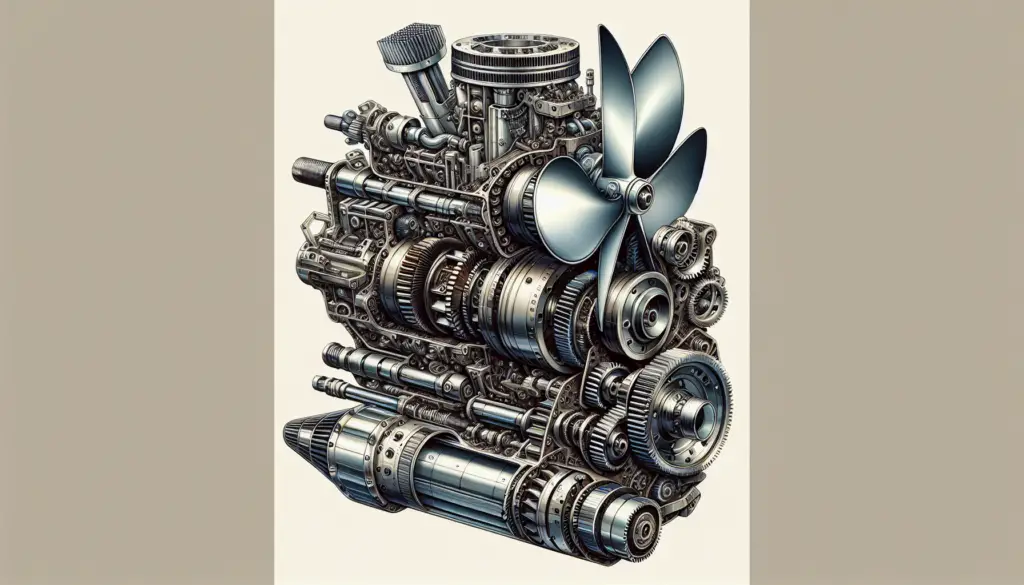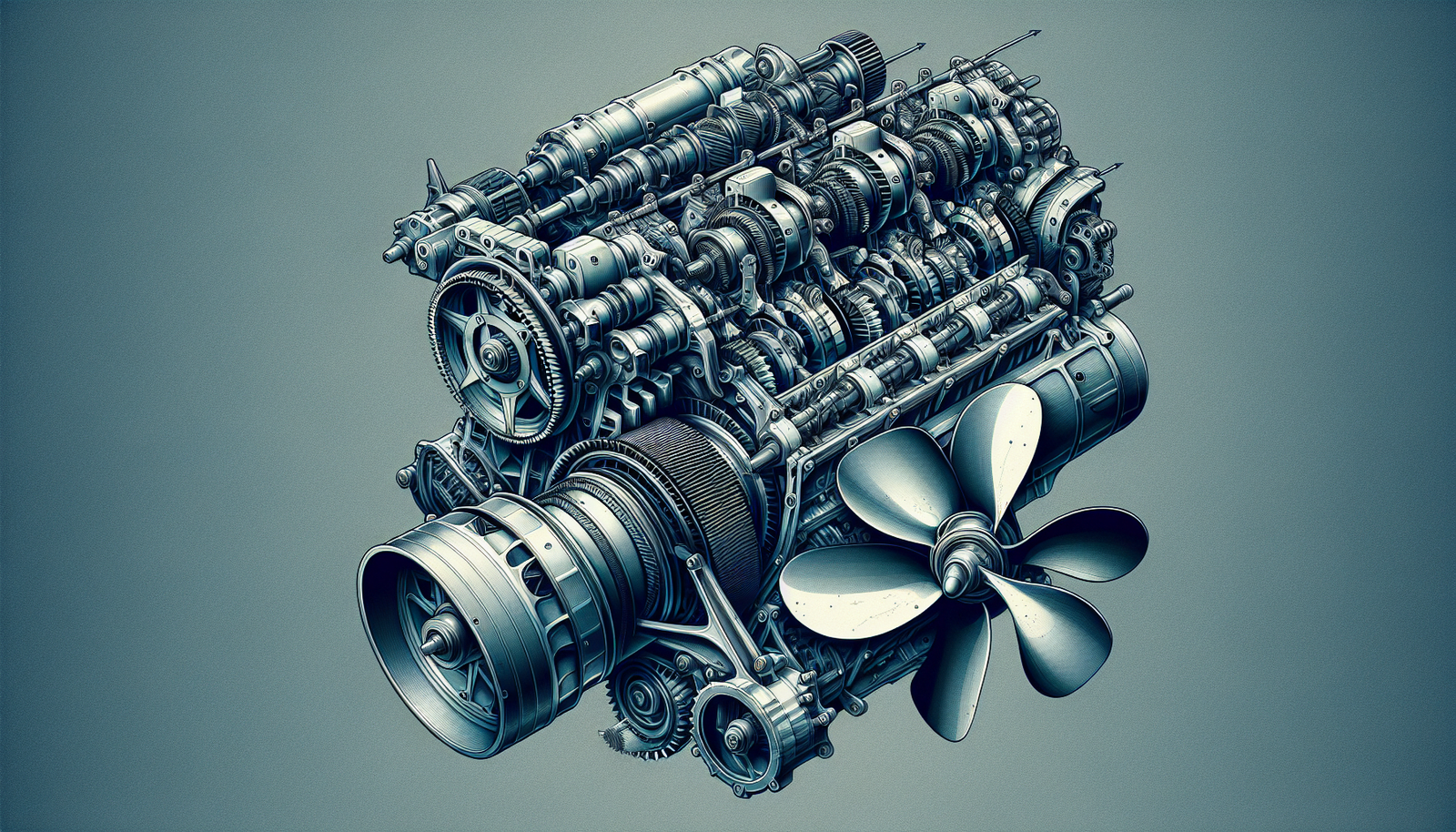You are out on the open water, the sun is shining, and all seems perfect until…that annoying noise from your boat’s engine begins. This article is your lifesaver, presenting a simple, step by step guide on how to troubleshoot a noisy boat engine. Let’s start your journey on turning that clamor into a whisper; simply a hum of efficiency that ensures you can cast your worries aside and start enjoying your water adventures once again. Through this, your understanding of your beloved vessel will deepen, and your bond with the open water will only strengthen. So now, let’s bring your boat back to its vibrant life by silencing that troublesome engine noise.

Identifying the Type of Noise
When faced with a noisy boat engine, your first step is to identify the type of noise. Different noises signal different problems. You might be dealing with a growl, a rattle, a hum, a whine or a knock. Each of these sounds communicate specific situations happening within the engine.
Understanding Different Noises
Understanding the type of noise is crucial in pinpointing what’s wrong with your engine. A whining noise, for example, might indicate issues with the belt or bearing. A knocking on the other hand, could be indicative of a problem with the fuel-air mixture inside the engine. A growling noise usually signifies a bearing problem, while a rattling could mean loose parts.
Common Indicators of Engine Problems
Common sounds that indicate engine problems include knocking, clicking, ticking, or knocking during idle. These noises can be a result of a variety of underlying issues, including a timing belt problem, low oil pressure, or even valve train problems. It’s important to get these noises checked out as soon as possible to avoid serious engine damage.
Pinpointing the Source of the Noise
Once you understand the kind of noise you’re hearing, the next step is to determine where it’s coming from. This could be a little tricky, particularly because sound waves can travel and bounce around your engine, making it seem like the noise is coming from a different area than its actual source. Using a mechanic’s stethoscope can help you pinpoint the source of the noise with much more accuracy.
Understanding the Causes of Noises
A noisy boat engine can have a number of causes. These range from mechanical wear and tear, poor lubrication, gear problems, to fuel system issues. Identifying the cause of the noise is critical in addressing it effectively.
Mechanical Wear and Tear
Mechanical wear and tear is a common cause of engine noise resulting from long-term usage. As engine parts degrade over time, they might produce noise which won’t appear in a newer engine. Regular service will mitigate the effects of wear and tear, ensuring your engine lasts longer.
Poor Lubrication
Poor lubrication is another common cause of noise. Without sufficient lubrication, metal parts within your engine will scrape against each other and encourage friction, leading to potential damage and unwanted noise. Thus, checking and maintaining optimum oil levels in your engine is crucial to keep it in good shape.
Gear Problems
Faulty gears can produce symptoms like humming, whining, or chirping noises. This is typically caused by worn-out or broken gear teeth. Such issues should be addressed quickly to avoid costly repairs or replacements down the line.
Fuel System Issues
Problems with the fuel system can cause a variety of noises. For instance, a clogged fuel line might cause a whining or sucking noise. Proper fuel system maintenance can help avert such issues.
Checking Engine Belts
Checking your engine’s belts is crucial because they control many of your engine’s fundamental functions such as the alternator, water pump, and the power steering pump.
Identifying Damaged or Worn-Out Belts
If your engine belts are worn out, they’ll typically make a squeaking or squealing noise. Inspect your belts regularly for any signs of wear, including cracking, glazing, or separation of the belt layers.
Tightening Loose Belts
Loose belts are another common cause of noise. If you find that belts are loose, they should be tightened immediately to prevent further damage. Look for a professional or refer to your manufacturer’s manual for guidance on how to adjust belt tension accurately.
Replacing Faulty Belts
At times, the best solution is simply to replace the worn or loose belt. It’s a good idea to keep a spare belt on your boat for such occasions.

Inspecting the Propeller
A noisy engine might be caused by your propeller. To determine this, thoroughly inspect the propeller, analyse its balance and vibration, and look out for any shaft issues.
Checking for Propeller Damage
Check the blades for any signs of damage, be it dings, chips or cracks. A damaged propeller can lead to greater issues including damages to the gearbox.
Analysing Propeller Vibration and Balance
Are you experiencing excessive vibration? Your propeller might be the culprit. Imbalances in the propeller can cause vibrations that affect the engine’s performance and lead to unpleasant noises. In such a case, you may need to have your propeller balanced by a professional.
Dealing with Propeller Shaft Issues
Propeller shaft problems can also create unsettling noises. If your shaft is bent or misaligned, it can cause a considerable strain on the bearings and the engine, which could lead to a noticeable growling or rumbling noise.
Assessing Fuel Filter and Fuel Lines
Fuel lines and the fuel filter are another area you should check when diagnosing a noisy engine.
Examining the Fuel Filter
A clogged or dirty fuel filter might produce noises like a light sucking or a whistling. It’s important to inspect, clean, and replace these filters regularly to maintain an optimally performing engine.
Looking for Leaks in Fuel Lines
Leaking fuel lines can lead to sputtering, popping noises, or even loss of power. Always check your lines for signs of corrosion or damage.
Proper Fuel System Maintenance
With proper maintenance of the fuel system, you can avoid many of the noises linked to fuel line leaks or clogged filters.
Evaluating the Exhaust System
Noises from a boat engine might also originate from the exhaust system, so it’s vital to keep an eye on this important component.
Recognising Exhaust Problems
Common exhaust problems include issues with the components such as the manifold, muffler, and exhaust pipes. A leaking exhaust, for instance, can make a loud roaring noise.
Handling Leaks in Manifold and Elbows
Leaks in the manifold and the elbows often cause a ticking or tapping noise when the engine is cold, but typically disappears as the engine warms up. Recognising and addressing these leaks early on helps prevent further damage.
Addressing Issues with Mufflers and Exhaust Pipes
Issues like corrosion or damage to the muffler and exhaust pipes can cause a loud rumbling noise. Regular inspections can help identify and fix these problems in time.
Addressing Transmission and Gearbox Noise
Transmission and gearbox are other common sources of boat engine noise.
Identifying Gearbox Problems
When the gearbox is not functioning properly, it might create noises like humming, buzzing, or clunking. Regular transmission maintenance can help keep such problems at bay.
Resolving Transmission Issues
Transmission issues like fluid leaks or worn out parts could produce a range of unsettling noises. It’s always a good idea to have your transmission inspected by a professional if you suspect there’s a problem.
Understanding the Link Between Noise and Gearbox Wear
There’s a significant link between the types of noise your engine makes and the condition of your gearbox. Persistent noise can suggest a worn-out gearbox. Regular check-ups can prevent gearbox wear and mitigate resultant noise.
Dealing with Noise from Water Pump
The water pump is another component that might be causing noise in your engine. It’s essential you know how to identify this noise and address it.
Signs of Water Pump Noise
Noises from the water pump often sound like whines or squeals, suggesting problems with the bearings or impeller. It’s important to address these issues promptly to avoid overheating and severe engine damage.
Maintaining the Coolant System
The coolant system, including the water pump, should be regularly maintained to avoid unnecessary noise. This includes checking the coolant levels and ensuring the pump is functioning properly.
Repairing or Replacing Water Pumps
If water pump problems persist, it might be time to consider repairs or even a full replacement. Contact a professional if you aren’t confident in diagnosing and repairing this yourself.
Maintaining Engine Mounts
Engine mounts are designed to absorb vibrations and shocks produced by the engine, but when they fail, they can cause a range of unwelcome noises.
Diagnosing Issues with Engine Mounts
Issues with your engine mounts might create clunking or knocking noises, especially while accelerating, turning, or braking. Regular inspections can help identify any problems with the mounts and prevent noise.
Correcting Misalignment Problems
If your engine mounts are misaligned, they may cause vibrations and noise. A professional can help realign these mounts and resolve the issue.
Replacing Broken Mounts
Sometimes, the best solution is to replace the faulty mounts. When in doubt, consult a professional to determine whether the mounts need to be replaced.
Ensuring Regular Engine Servicing
Regular engine servicing is key in preventing and addressing noise from your boat engine. Though it might seem like an expense, you’ll save more in the long run by avoiding costly repairs.
Establishing a Routine Maintenance Schedule
A routine maintenance schedule helps you keep up with the necessary inspections, services, and replacements. This way, you can catch issues before they escalate into major problems.
Benefits of Regular Servicing
Regular servicing not only extends the lifespan of your boat engine, it also optimises performance, efficiency, and economy. It’s an investment that pays off when you enjoy smoother and quieter rides on your boat.
Identifying Major Problems Early Through Routine Check-ups
Routine check-ups make it possible to identify and fix issues early, before they turn into major, expensive repairs. They’re an integral part of preventing noise and maintaining a quiet, efficient boat engine.
In conclusion, troubleshooting a noisy boat engine involves identifying the type of noise, understanding the likely causes of the noise, and executing the necessary repairs or replacements. Regular maintenance and timely check-ups are key to ensuring your boat engine remains quiet and efficient.

